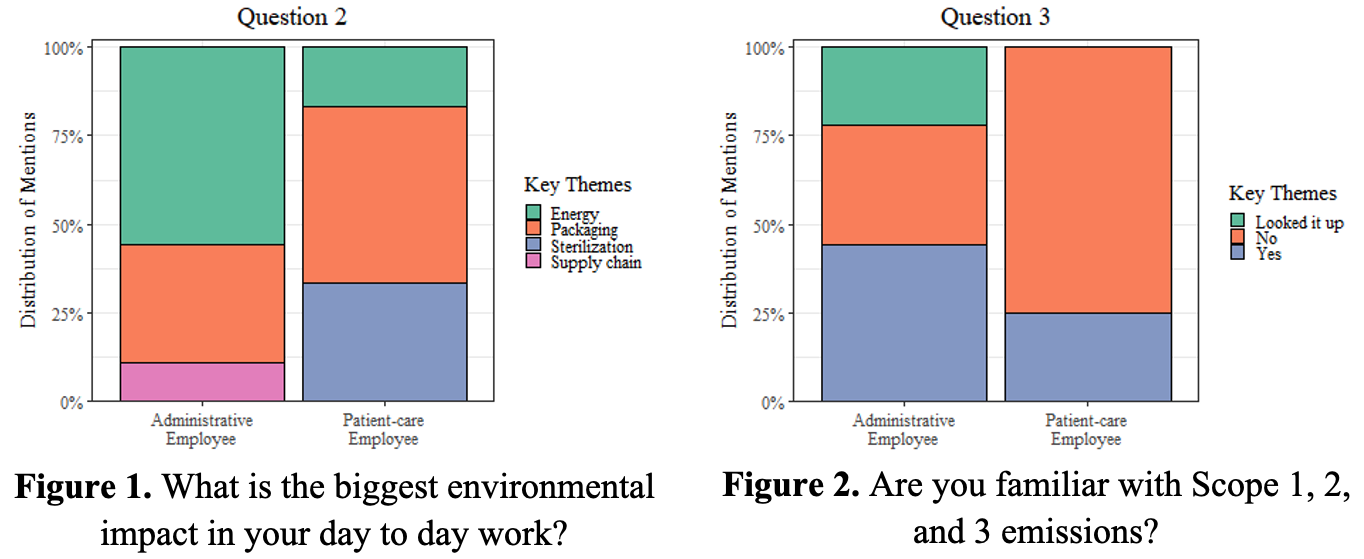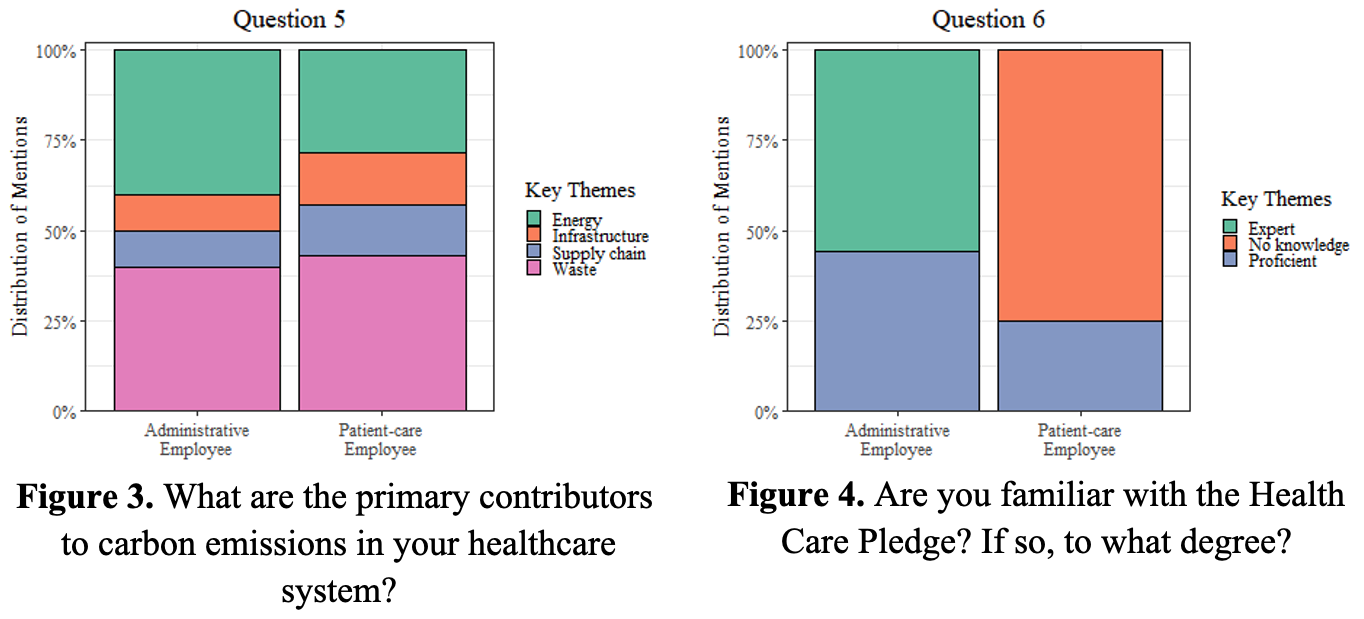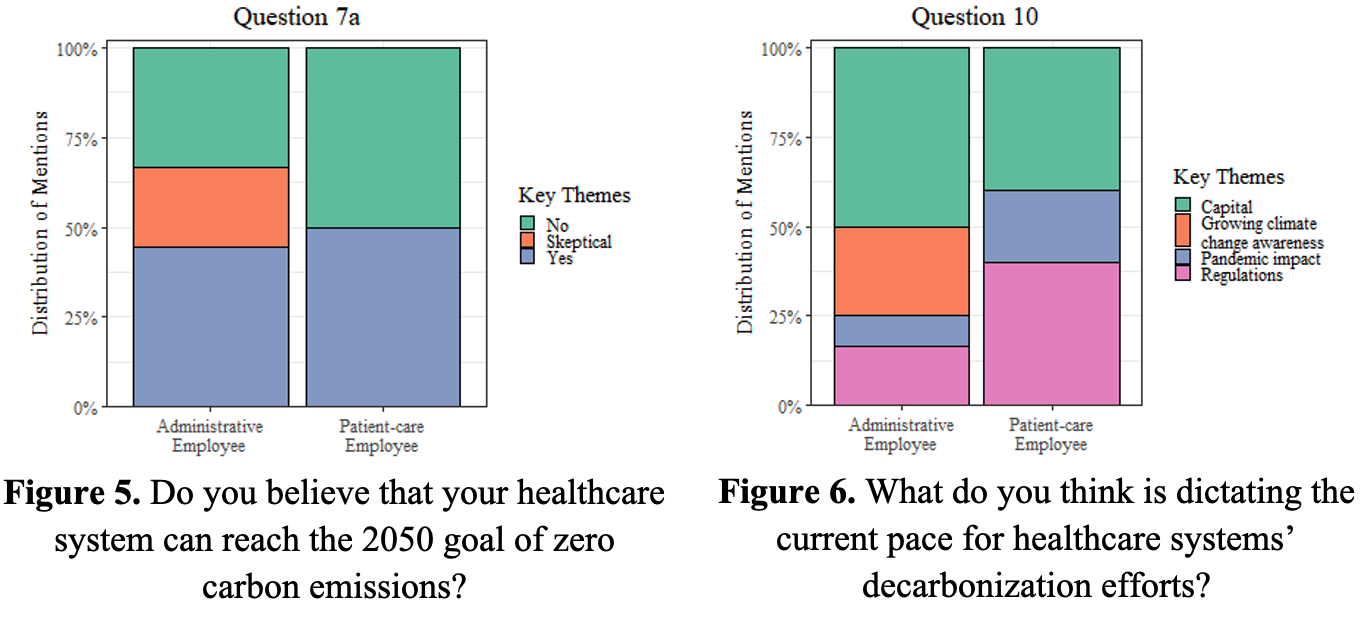
Removing Barriers to the US Healthcare Pledge – Recommendations to Drive Sustainability and Resilience Against Climate Change
As part of my Institute for Sustainability, Energy, and Environment (iSEE) Fellows Program Capstone Project, I collaborated with IMEG, an engineering design firm focused on retro-commissioning and decarbonizing buildings. My team, comprised of four other students from different disciplines and myself representing the engineering discipline, worked alongside IMEG employees to address the barriers preventing healthcare systems from signing the US Healthcare Pledge.
This case study highlights my role in this multidisciplinary effort, focusing on interviews conducted with Carle Health employees and other healthcare organizations. We analyzed these interviews to identify critical roadblocks, including capital restrictions, lack of leadership initiative, and challenges in data centralization. We developed recommendations to guide healthcare systems in their decarbonization journey based on our findings.
The results of this project will serve as a foundational resource for IMEG’s continued work with hospital systems as decarbonization becomes an increasingly key component of climate resilience in healthcare. This experience deepened my understanding of healthcare operations' complexities and the urgent need for sustainable infrastructure to combat climate change.

Situation
IMEG, an engineering design firm, assists various industries, including healthcare, reduce their carbon footprints through retro-commissioning and decarbonization initiatives. One of their clients, Carle Health, sought guidance to address the roadblocks hindering its ability to sign the US Healthcare Pledge. The Pledge commits healthcare systems to reducing emissions by 50% by 2030 and achieving net zero by 2050, aligning with national climate goals.
Given the healthcare sector's growing role in mitigating climate change, Carle Health needed to overcome barriers like capital limitations, lack of leadership buy-in, and data centralization issues. My capstone project team, composed of iSEE Fellows, identified these obstacles and proposed solutions. Working with IMEG employees and conducting interviews with healthcare system stakeholders, our goal was to provide Carle Health with a comprehensive report to guide its decarbonization strategy and serve as a blueprint for other hospital systems.
Table 1. Summary of results from discourse analysis.
|
Survey Item |
Category |
Number of Total Mentions |
Representative Phrase |
|
|
Administrative |
Healthcare |
|||
|
Question 1: What does sustainability mean to you? |
Resources (i.e waste, energy) |
3/10 |
2/4 |
“It means to reduce the impact that healthcare has on the environment from a number of standpoints: energy, water, waste generation.” |
|
Future Generations |
4/10 |
1/4 |
“The opportunity to change our emissions and practices right now. Make change for future generations.” |
|
|
Community |
3/10 |
2/4 |
“Something designed to benefit people, focused more on local communities, particularly as a healthcare professional.” |
|
|
Question 2: What is the biggest environmental impact in your day to day work? |
Energy |
5/7 |
1/4 |
“In healthcare … energy consumption is extremely high.” |
|
Packaging |
3/7 |
3/4 |
“The biggest thing is that everything is in its own packaging.” |
|
|
Supply chain |
1/7 |
0/4 |
“Scope 3 emissions- supply chain. 70-80% emissions from scope 3.” |
|
|
Sterilization |
0/7 |
2/4 |
“A lot of waste around sterility.” |
|
|
Question 3: Are you familiar with Scope 1, 2, and 3 emissions? |
Yes |
4/10 |
1/4 |
“Pretty good understanding of the scope 1,2,3.” |
|
No |
3/10 |
3/4 |
“Does not know. Wrong person to ask.” |
|
|
Looked it up |
2/10 |
0/4 |
“I didn’t know, so I had to look it up.” |
|
|
Question 4: How does your healthcare system overcome roadblocks? |
Education |
1/6 |
1/3 |
“Education and awareness on scopes we can control…Provide strategic plans to teach why and understand priorities and put metrics to that.” |
|
Capital/investment |
2/6 |
2/3 |
“ROI, a simple payback or net present value.” |
|
|
Expanding team/positions |
2/6 |
1/3 |
“We have expanded our team which will allow us to dive into gathering data and drive behavior changes.” |
|
|
Working with vendors |
1/6 |
0/3 |
“Inducing pressure on local utility.” |
|
|
Question 5: What are the primary contributors to carbon emissions in your healthcare system? |
Energy |
4/8 |
2/4 |
“The massive buildings being powered in a non-efficient manner.” |
|
Infrastructure |
1/8 |
1/4 |
“Infrastructure is the biggest.” |
|
|
Waste |
4/8 |
3/4 |
“Waste production, excess food in hospitals that must be thrown out.” |
|
|
Supply chain |
1/8 |
1/4 |
“Meds that get thrown out have to be disposed in black bins, which are even more expensive to process and are driven up to Wisconsin.” |
|
|
Question 6: Are you familiar with the Healthcare Pledge? If so, to what degree? |
Expert |
5/9 |
0/4 |
“Yes. Has not been discussed with leadership. Some talk amongst the staff and team.” |
|
Proficient |
4/9 |
1/4 |
“Have heard of it, but don’t know the details.” |
|
|
No knowledge |
0/9 |
3/4 |
“No” |
|
|
Question 7a: Do you believe that your healthcare system can reach the 2050 goal of zero carbon emissions? |
Yes |
4/9 |
2/4 |
“Totally possible.” |
|
No |
3/9 |
2/4 |
“Almost impossible to get to zero.” |
|
|
Skeptical |
2/9 |
0/4 |
“As an organization, I don't want to speak for the whole thing. From a facilities perspective, that’s a huge ask.” |
|
|
Question 7b: If yes, why? |
Regulatory Requirements |
1/4 |
0/2 |
“More and more regulatory requirements that will push Carle to go that way.” |
|
Aggressive goal setting |
3/4 |
2/2 |
“[We have] aggressive goal setting.” |
|
|
Question 7c: If no/skeptical, why not? |
Capital |
3/5 |
0/2 |
“Healthcare costs continue to skyrocket, and that is first priority.” |
|
Lack of initiatives |
3/5 |
2/2 |
“I have a hard time seeing this as a priority when they’re struggling to get nurses.” |
|
|
No penalization |
0/5 |
1/2 |
“Until there is a law put in place penalizing the waste and emissions, I do not think they are gonna want to change anything.” |
|
|
Question 9: If your hospital system has not signed the pledge, what do you think is the reason for this? |
Lack of leadership approval |
2/7 |
0/2 |
“Getting everyone on board is a challenge.” |
|
Not enough bandwidth |
3/7 |
1/2 |
“Will require education, resources, funding, etc.” |
|
|
Need for data centralization |
1/7 |
1/2 |
“I would need to see more data on it and a proven plan of implementation.” |
|
|
Not a priority |
3/7 |
0/2 |
“Doesn’t want to sign something without knowing that they can achieve it. Harder thing to focus on with everything going on in healthcare.” |
|
|
Question 10: What do you think is dictating the current pace for healthcare systems’ decarbonization efforts? |
Pandemic Impact |
1/8 |
1/3 |
“Coming out of the pandemic, there are competing interests for money.” |
|
Capital |
6/8 |
2/3 |
“Don’t want to change anything” – they’re just looking at dollar signs, not motivated by anything other than profit.” |
|
|
Regulations |
2/8 |
2/3 |
“Where the regulatory pressures are, who is in charge” |
|
|
Growing climate change awareness |
3/8 |
0/3 |
“Cannot be creating an environment where they are polluting the community.” |
|
|
Question 11: Who do you see as the primary stakeholders and leader positions within your organization as it relates to decarbonization? |
Sustainability manager |
3/6 |
1/2 |
“Sustainability manager.” |
|
CEO |
2/6 |
1/2 |
“The CEO.” |
|
|
Senior executives/ VP of Facilities |
4/6 |
1/2 |
“The people above him who give the green light for the project to be done.” |
|
|
No one |
0/6 |
1/2 |
“No one is really looking to do that, it is not a priority at this time. Sad but the truth.” |
|
|
Question 12: Who do you feel is impacted by your organization's level and pace of decarbonization? |
Community |
4/7 |
0/2 |
“Surrounding community, immediate community, secondary community, and the state.” |
|
Organization |
3/7 |
0/2 |
“EBS is impacted on the level and environmental services (housekeepers).” |
|
|
Low-income population |
1/7 |
0/2 |
“Lower socio-economic people are disproportionately impacted by climate change.” |
|
|
Patients |
1/7 |
0/2 |
“The patient [is impacted].” |
|
|
Patient-care employees |
1/7 |
1/2 |
“[Nurses are impacted]. Find a nurse & talk to them about their workflow – they’re the boots on the ground.” |
|
|
Everyone |
2/7 |
1/2 |
Admin “In a sense, everybody is [impacted.]” |
|
|
Question 13: What do you feel is a healthcare system's responsibility when it comes to sustainability and dealing with climate change? |
Hippocratic oath |
3/6 |
1/2 |
“[We have a] Responsibility to the hippocratic oath to do no harm… whether that's for the environment or communities.” |
|
Community health is environmental health |
3/6 |
1/2 |
“We’re in healthcare to help people, and we’re directly harming them by harming the planet.” |
|
Task
As a member of the iSEE capstone team, my primary responsibility was to support IMEG in identifying and analyzing the barriers preventing Carle Health and other healthcare systems from signing the US Healthcare Pledge. I was tasked with interviewing Carle Health employees and external healthcare organizations to gather insights on roadblocks such as capital restrictions, lack of leadership engagement, and decentralized data management.
In addition to conducting discourse analysis, I provided an engineering perspective to the team, particularly in understanding the technical and operational challenges involved in retro-commissioning and decarbonizing complex healthcare facilities. I utilized my mechanical engineering background to help the team assess the infrastructure-related barriers, such as energy consumption and system inefficiencies, and to propose engineering-based solutions for improving energy efficiency and centralizing data collection.
This combination of technical analysis and strategic recommendations was critical to creating a comprehensive report for IMEG, helping healthcare systems progress toward their sustainability goals.



Action
To tackle my responsibilities in this project, I applied a methodical approach:
Data Collection & Discourse Analysis: I began by conducting structured and semi-structured interviews with healthcare employees and administrators at Carle Health and other external organizations. This allowed me to gather detailed insights into the challenges each system faced in its decarbonization efforts. The interviews focused on barriers such as capital constraints, lack of leadership initiative, and difficulties centralizing data.
Engineering Perspective & Technical Assessment: Leveraging my engineering background, I assessed the energy efficiency of healthcare systems and infrastructure, helping the team understand technical roadblocks like inefficient energy consumption and outdated systems. I integrated these findings into our discourse analysis, highlighting the technical challenges associated with retro-commissioning and decarbonization, particularly in large healthcare facilities.
Recommendation Development: Based on the findings from the interviews and technical assessments, I contributed to developing recommendations for IMEG and Carle Health. These included strategies to overcome capital restrictions, enhance leadership buy-in, and improve data centralization, which are critical steps before healthcare systems sign the US Healthcare Pledge and meet their decarbonization goals.
Collaboration and Reporting: I regularly communicated my findings to both my capstone team and IMEG’s staff, ensuring that our analysis was thorough and aligned with the broader objectives of the project. This collaboration ensured our recommendations were both feasible and strategically valuable for IMEG’s ongoing work with healthcare systems.

Result
The analysis and recommendations I provided as part of the iSEE capstone team contributed significantly to IMEG’s work with Carle Health and other healthcare systems. Our discourse analysis identified roadblocks that were preventing these systems from signing the US Healthcare Pledge and advancing their decarbonization efforts.
The recommendations we developed, including strategies for increasing leadership engagement, accessing financial incentives, and implementing data centralization systems, will serve as a guide for IMEG’s ongoing decarbonization work. By addressing these barriers, healthcare systems can take meaningful steps toward reducing their carbon footprints, meeting the 2050 net-zero emissions goal, and enhancing climate resilience.
This project not only advanced IMEG’s mission to decarbonize healthcare facilities but also solidified the role of healthcare systems in mitigating climate change. The data and strategies I helped develop will inform future projects and enable IMEG to expand its impact across the healthcare sector.
Project Skills
This project allowed me to apply my engineering expertise, collaborate on interdisciplinary tasks, and contribute to significant decarbonization initiatives in the healthcare sector.
- Discourse Analysis – Conducting detailed discourse analysis from interviews to identify barriers to decarbonization in healthcare systems.
- Engineering Perspective – Providing technical assessments related to energy efficiency, infrastructure retro-commissioning, and decarbonization.
- Data Collection & Analysis – Gathering and analyzing data from structured interviews with healthcare professionals and administrators.
- Infrastructure Assessment – Evaluating the technical challenges of retro-commissioning healthcare facilities and proposing engineering solutions.
- Recommendation Development – Contributing to strategies to overcome capital restrictions, leadership engagement challenges, and data centralization issues.
- Sustainability Strategy – Assisting in the creation of comprehensive recommendations for healthcare systems to meet decarbonization goals.
Professional Skills
- Project Management – Managing research tasks and ensuring the successful completion of interviews and data analysis for the project.
- Technical Communication – Regularly updating both the iSEE capstone team and IMEG staff on findings, ensuring alignment with project objectives.
- Problem-solving – Addressing the technical and organizational challenges of healthcare decarbonization through strategic recommendations.
- Team Collaboration – Collaborating effectively with cross-disciplinary team members to conduct research and develop solutions.
- Sustainability Mindset – Understanding the role healthcare systems play in building climate resilience and reducing their carbon footprint.